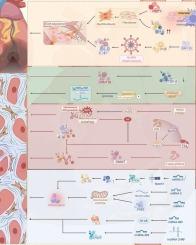心肌纤维化中线粒体和炎症的表观遗传学研究。
IF 3.7
2区 生物学
Q2 CELL BIOLOGY
引用次数: 0
摘要
心肌纤维化(CF)是心肌损伤后发生的反应性重构过程。它的特点是细胞外基质(ECM)蛋白在心脏间质中积累,导致心肌壁增厚和心功能受损。这最终会导致心力衰竭。包括缺血和感染在内的各种心脏损伤可引发心脏炎症反应,导致慢性炎症和进行性结构损伤,从而导致CF。炎症和纤维化密切相关,在心力衰竭的发生中起着至关重要的作用。心肌作为一种高度氧化的组织,需要高能量来持续泵血。线粒体是细胞的能量中心,对维持最佳心脏功能至关重要。它们在促进炎症和对致病性感染的反应中也起着重要作用。本文综述了CF中线粒体控制炎症反应的病理机制,并从表观遗传学角度探讨CF的炎症调节作用和分子机制。我们简要介绍了一些有前途的分子调控因子,这些调控因子可能是CF的潜在线粒体靶点。最后,我们讨论了这些发现在改善CF治疗和预防方面的潜在应用。本文章由计算机程序翻译,如有差异,请以英文原文为准。

Epigenetics of mitochondrial and inflammation in cardiac fibrosis
Cardiac fibrosis (CF) is a reactive remodeling process that occurs in response to myocardial injury. It is characterized by the accumulation of extracellular matrix (ECM) proteins in the cardiac interstitium, resulting in thickening of the myocardial wall and impaired cardiac function. This ultimately leads to heart failure. Various heart injuries, including ischemia and infection, can trigger inflammatory reactions in the heart, leading to chronic inflammation and progressive structural damage, which contribute to CF. Inflammation and fibrosis are closely intertwined and play crucial roles in the development of heart failure. The myocardium, being a highly oxidized tissue, requires high energy for continuous blood pumping. Mitochondria, the energy centers of cells, are essential for maintaining optimal heart performance. They also play a significant role in promoting inflammation and responding to pathogenic infections. In this article, we review the pathological mechanisms of mitochondrial-controlled inflammatory response in CF and explore the inflammatory regulatory effects and molecular mechanisms of CF from an epigenetic perspective. We provide a brief introduction to promising molecular regulatory factors that target epigenetics, which may serve as potential mitochondrial targets for CF. Finally, we discuss the potential application of these findings in improving the treatment and prevention of CF.
求助全文
通过发布文献求助,成功后即可免费获取论文全文。
去求助
来源期刊

Cellular signalling
生物-细胞生物学
CiteScore
8.40
自引率
0.00%
发文量
250
审稿时长
27 days
期刊介绍:
Cellular Signalling publishes original research describing fundamental and clinical findings on the mechanisms, actions and structural components of cellular signalling systems in vitro and in vivo.
Cellular Signalling aims at full length research papers defining signalling systems ranging from microorganisms to cells, tissues and higher organisms.
 求助内容:
求助内容: 应助结果提醒方式:
应助结果提醒方式:


